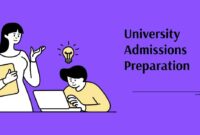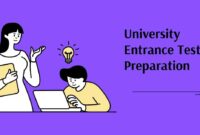Sarah stared at her acceptance letter from Cambridge University, tears of joy streaming down her face. Just eighteen months earlier, she had been struggling with basic algebra and could barely finish a timed essay. What changed everything? A structured approach to university entrance exam preparation that transformed her from an average student into a confident test-taker ready for higher education.
Your journey to university doesn’t have to be overwhelming. With the right college entrance exam preparation strategy, you can achieve the scores you need to secure your dream university spot. This comprehensive guide will walk you through proven techniques that have helped thousands of students succeed in their academic entry test preparation.
Understanding University Entrance Exams
University entrance exams serve as the gateway to higher education across Europe and beyond. These standardized tests evaluate your academic readiness and help universities select the most qualified candidates for their programs.
Types of University Entrance Exams
Different countries and universities require various entrance examinations. In the UK, you might encounter the SAT, UKCAT for medical programs, or subject-specific tests like the MAT for mathematics. European universities often use their national systems, such as the Abitur in Germany or the Baccalauréat in France.
Understanding which exams your target universities require is the first step in your university admission test readiness journey. Research early to avoid last-minute surprises and ensure you have adequate time for preparation.
What Universities Look For
Admissions committees evaluate more than just test scores. They examine your critical thinking skills, subject knowledge, time management abilities, and overall academic potential. Your performance on entrance exams demonstrates these qualities in a standardized format that allows fair comparison among applicants.
Creating Your Higher Education Exam Study Plan
A well-structured study plan forms the foundation of successful university entrance exam preparation. Without proper planning, even the most dedicated students can find themselves unprepared when test day arrives.
Assessing Your Current Level
Before diving into intensive study, honestly evaluate your current academic standing. Take a practice test under timed conditions to identify your strengths and weaknesses. This baseline assessment guides your study priorities and helps you allocate time effectively.
Document your scores in each subject area and note which question types cause the most difficulty. This information becomes invaluable when creating your personalized study schedule.
Setting Realistic Goals
Establish specific, measurable goals for your university selection exam readiness. Instead of aiming to “do better,” set concrete targets like “improve math score by 150 points” or “increase reading comprehension accuracy to 85%.”
Break down large goals into smaller, weekly milestones. This approach makes your preparation feel more manageable and provides regular opportunities to celebrate progress.
Time Management Strategies
Effective time management separates successful students from those who struggle. Create a detailed schedule that balances exam preparation with your regular coursework and extracurricular activities.
Dedicate specific time blocks to different subjects, ensuring you address all areas tested on your target exams. For comprehensive university entrance exam preparation, most students benefit from 2-3 hours of focused study daily over several months.
Subject-Specific Preparation Strategies
Each subject area requires tailored approaches to maximize your college application exam preparation effectiveness. Understanding these differences helps you use your study time more efficiently.
Mathematics Preparation
Mathematics sections often cause the most anxiety for students, but systematic preparation can build confidence and competency. Start with fundamental concepts before advancing to complex problem-solving.
Practice different question formats regularly. Many entrance exams include multiple-choice questions, grid-in responses, and extended problem-solving sections. Familiarity with each format reduces test-day stress and improves performance.
Create a formula sheet for quick reference, but focus on understanding concepts rather than memorizing procedures. Strong conceptual understanding allows you to adapt to unfamiliar problem types.
English and Reading Comprehension
Strong reading and writing skills are essential for success in any university program. Your admission test study guide should include regular reading practice across various text types and difficulty levels.
Improve your vocabulary systematically by learning 10-15 new words weekly. Focus on academic vocabulary commonly found in university-level texts. Keep a vocabulary journal and review words regularly to ensure retention.
Practice writing clear, concise essays under time pressure. Many entrance exams include written components that evaluate your ability to organize ideas and communicate effectively.
Science Sections
Science sections test both knowledge and analytical thinking. Review fundamental concepts in biology, chemistry, and physics, depending on your exam requirements.
Focus on understanding scientific reasoning rather than memorizing isolated facts. Practice interpreting graphs, analyzing experimental data, and drawing logical conclusions from evidence.
Test-Taking Techniques and Strategies
Mastering content knowledge is only half the battle. Developing effective test-taking strategies significantly improves your campus entry exam preparation outcomes.
Time Management During Exams
Learn to pace yourself effectively during timed tests. Practice allocating specific time limits to different sections and question types. Develop awareness of when to move on from challenging questions and return to them later if time permits.
Use practice tests to experiment with different timing strategies. Some students prefer to answer easy questions first, while others work through sections sequentially. Find the approach that works best for you.
Strategic Guessing
When you encounter difficult questions, educated guessing can improve your overall score. Learn to eliminate obviously incorrect answer choices and make informed selections from remaining options.
Understand your exam’s scoring system. Some tests penalize incorrect answers, while others only count correct responses. This knowledge influences your guessing strategy and risk tolerance.
Managing Test Anxiety
Even well-prepared students can struggle with test anxiety. Develop relaxation techniques such as deep breathing exercises or progressive muscle relaxation to use before and during exams.
Maintain perspective by remembering that entrance exams are just one component of your university application. While important, they don’t define your worth or entirely determine your future success.
Academic Testing Preparation Strategies
Effective preparation goes beyond studying content. Implementing proven academic testing preparation strategies enhances your overall readiness and confidence.
Creating Effective Study Materials
Develop personalized study resources that match your learning style. Visual learners benefit from diagrams and charts, while auditory learners might prefer recorded notes or study group discussions.
Summarize key concepts in your own words. This active processing helps identify gaps in understanding and strengthens memory retention. Create flashcards for quick review of important formulas, vocabulary, and concepts.
Practice Test Strategies
Regular practice testing is crucial for university exam readiness plan success. Take full-length practice tests under realistic conditions to build stamina and identify timing challenges.
Analyze your practice test results thoroughly. Don’t just check your score—review every question, including ones you answered correctly. Understanding why right answers are right strengthens your overall comprehension.
For detailed strategies on maximizing your practice test effectiveness, explore university entry exams strategies that have proven successful for thousands of students.
Building Long-Term Study Habits
Sustainable preparation requires developing study habits that you can maintain over months of preparation. Short bursts of intensive cramming rarely produce optimal results for university entrance exams.
Consistency Over Intensity
Regular, moderate study sessions typically outperform sporadic marathon sessions. Aim for consistency in your daily preparation routine, even if you can only dedicate 30-45 minutes on busy days.
Create a study environment that supports focus and concentration. Minimize distractions by finding a quiet space and using tools like website blockers during study time.
Active Learning Techniques
Passive reading and highlighting are ineffective for long-term retention. Implement active learning strategies such as self-testing, teaching concepts to others, and connecting new information to existing knowledge.
Use the “teach-back” technique regularly. If you can explain a concept clearly to someone else, you truly understand it. This approach quickly identifies areas needing additional review.
Regular Review and Assessment
Schedule weekly review sessions to revisit previously studied material. Spaced repetition strengthens memory and prevents forgetting important concepts as you progress through your preparation.
Track your progress using practice test scores and self-assessments. This data helps you adjust your study plan and ensures you’re moving toward your goals consistently.
Advanced Preparation Techniques
As you progress in your university admission exams preparation, incorporating advanced techniques can provide the competitive edge needed for top-tier university admission.
Cross-Subject Integration
Look for connections between different subject areas. Mathematical concepts apply to science problems, while strong reading skills enhance performance across all sections. Integrated understanding often leads to deeper comprehension and improved problem-solving abilities.
Analyzing Question Patterns
Spend time understanding how your target exams construct questions. Many standardized tests follow predictable patterns in question types and difficulty progression. Recognition of these patterns can improve your strategic approach to different sections.
Study official practice materials and released tests to identify recurring themes and question formats. This analysis helps you anticipate what to expect and reduces surprises on test day.
Developing Mental Flexibility
University entrance exams often include questions designed to test adaptability and creative thinking. Practice approaching problems from multiple angles and developing comfort with ambiguity.
Engage with challenging material that pushes your thinking beyond standard textbook problems. This exposure builds the mental flexibility that admissions committees value in prospective students.
Resources and Support Systems
No student succeeds in isolation. Building a strong support system and utilizing available resources significantly enhances your college entrance exam preparation effectiveness.
Study Groups and Peer Support
Form or join study groups with other students preparing for similar exams. Collaborative learning provides motivation, accountability, and exposure to different problem-solving approaches.
Establish ground rules for productive study groups, including specific goals for each session and agreements about preparation expectations. Unfocused group study can waste time and create false confidence.
Professional Guidance
Consider working with tutors or test preparation specialists, especially in areas where you struggle most. Professional guidance can accelerate your progress and provide personalized strategies based on your specific needs.
Research tutoring options carefully. Look for instructors with proven track records and teaching approaches that match your learning style. Quality instruction is an investment in your educational future.
For comprehensive support, explore specialized university admission exams strategies that address both content knowledge and test-taking skills.
Online Resources and Tools
Take advantage of free and paid online resources, including video lectures, practice question databases, and interactive learning platforms. These tools supplement your core preparation materials and provide different perspectives on challenging concepts.
Evaluate online resources critically. Not all materials are created equal, and low-quality resources can actually hinder your progress. Focus on reputable sources with positive user reviews and proven effectiveness.
Mental and Physical Preparation
Your mind and body work together during high-stakes testing situations. Comprehensive university selection exam readiness includes attention to your overall well-being.
Stress Management Techniques
Develop healthy coping mechanisms for managing preparation stress. Regular exercise, adequate sleep, and balanced nutrition all contribute to optimal cognitive performance and emotional stability.
Practice mindfulness or meditation techniques to improve focus and reduce anxiety. Even short daily sessions can significantly impact your ability to concentrate during lengthy study sessions and exams.
Maintaining Balance
While dedicated preparation is important, maintaining balance in your life prevents burnout and supports long-term success. Continue participating in activities you enjoy and maintain social connections.
Schedule regular breaks and rewards for achieving study milestones. This positive reinforcement helps sustain motivation throughout the often lengthy preparation process.
Sleep and Nutrition
Prioritize sleep quality, especially as exam dates approach. Sleep deprivation significantly impairs memory consolidation, decision-making, and overall cognitive performance.
Maintain stable eating habits and avoid dramatic dietary changes during preparation periods. Your brain needs consistent fuel to function optimally during both study sessions and actual exams.
Final Preparation and Test Day Success
The weeks leading up to your exam require a shift in focus from intensive learning to review, refinement, and maintaining peak performance conditions.
Last-Minute Review Strategies
Focus your final preparation on reviewing key concepts rather than learning new material. Create condensed review sheets covering the most important formulas, vocabulary, and concepts for quick reference.
Take one or two final practice tests, but avoid overloading yourself with excessive testing. The goal during this period is maintaining confidence and ensuring you’re comfortable with test procedures and timing.
Test Day Logistics
Plan all practical aspects of test day in advance. Know exactly where you’re testing, how you’ll get there, and what materials you’re allowed to bring. Arrive early to handle any unexpected issues calmly.
Prepare everything the night before, including acceptable identification, necessary supplies, and appropriate clothing. This preparation reduces morning stress and ensures you start the day feeling organized and confident.
During the Exam
Implement the strategies you’ve practiced throughout your preparation. Trust your training and avoid second-guessing techniques that have worked well during practice sessions.
Stay calm if you encounter unexpected difficulty. Remember that entrance exams are designed to be challenging, and feeling challenged doesn’t indicate poor preparation or likely failure.
For additional test-day strategies and preparation techniques, review comprehensive guides on university admission exams tactics that can help you maintain confidence and perform at your best.
After the Exam: Next Steps
Your preparation journey doesn’t end when you submit your test. Understanding what comes next helps you maintain momentum in your university application process.
Score Analysis and Interpretation
When scores become available, analyze them objectively. Celebrate improvements while identifying any areas that might need attention if you decide to retake the exam.
Compare your scores to the admission requirements of your target universities. If your scores fall within or above their typical ranges, you can proceed with confidence in your applications.
Retake Considerations
If your scores don’t meet your expectations or university requirements, consider retaking the exam. Many students improve significantly on their second attempt, especially when they can identify specific areas for targeted improvement.
However, avoid endless retaking without substantial additional preparation. Focus your efforts on addressing specific weaknesses identified in your initial attempt.
University Application Integration
Remember that entrance exam scores are just one component of your university application. Strong scores can’t compensate for weak applications in other areas, just as slightly lower scores don’t eliminate your chances if other application elements are exceptional.
Continue developing other aspects of your application, including essays, recommendation letters, and extracurricular achievements. For comprehensive guidance on securing your university spot, explore resources on preparing for university admission that address the entire application process.
Conclusion
Successful university entrance exam preparation requires dedication, strategy, and patience. By following the comprehensive approach outlined in this guide, you’ll be well-prepared to achieve the scores needed for admission to your dream university.
Remember that preparation is a marathon, not a sprint. Consistent effort over time produces better results than frantic last-minute cramming. Trust in your abilities, maintain perspective, and approach your exams with confidence.
Your university journey begins with these entrance exams, but they’re just the first step in a much larger adventure. With proper preparation and the right mindset, you’ll soon find yourself walking across campus as a confident university student, ready to embrace all the opportunities that higher education provides.
For additional resources and detailed preparation strategies, explore comprehensive guides on university admission tests preparation and university entrance tests preparation to enhance your readiness for this important milestone in your educational journey.



